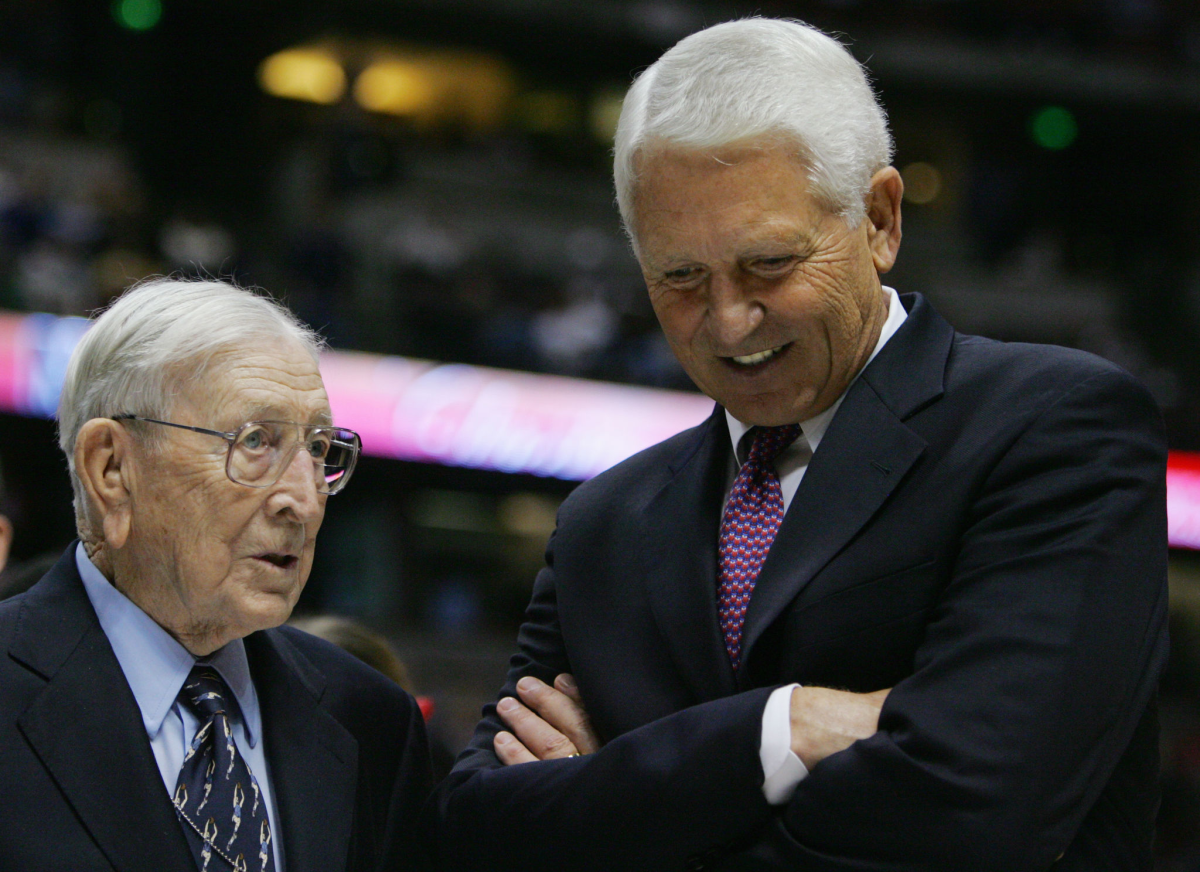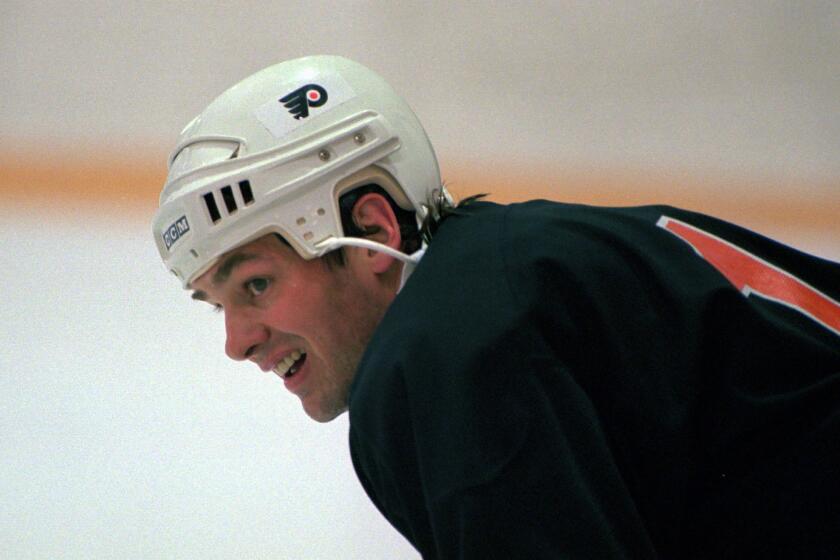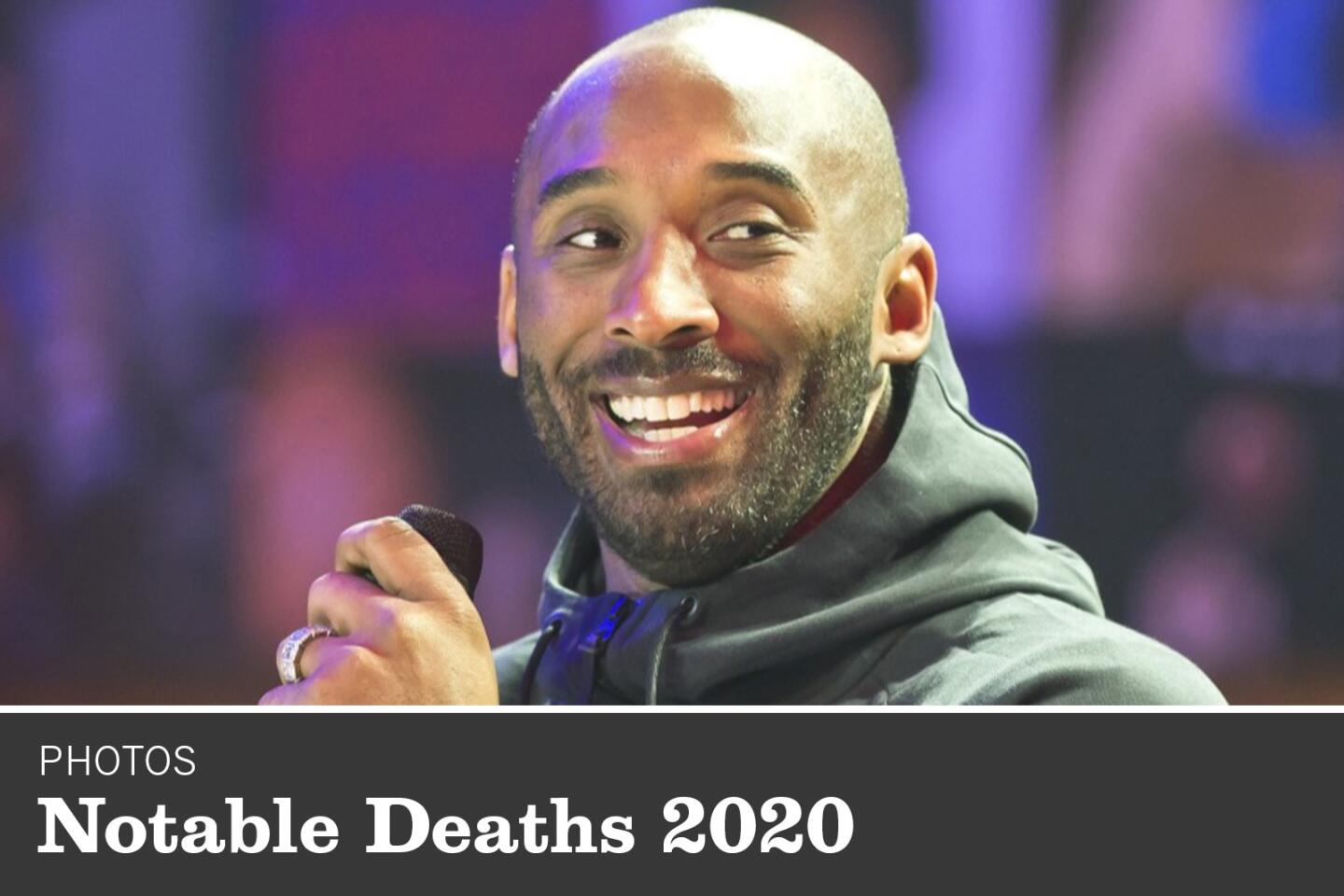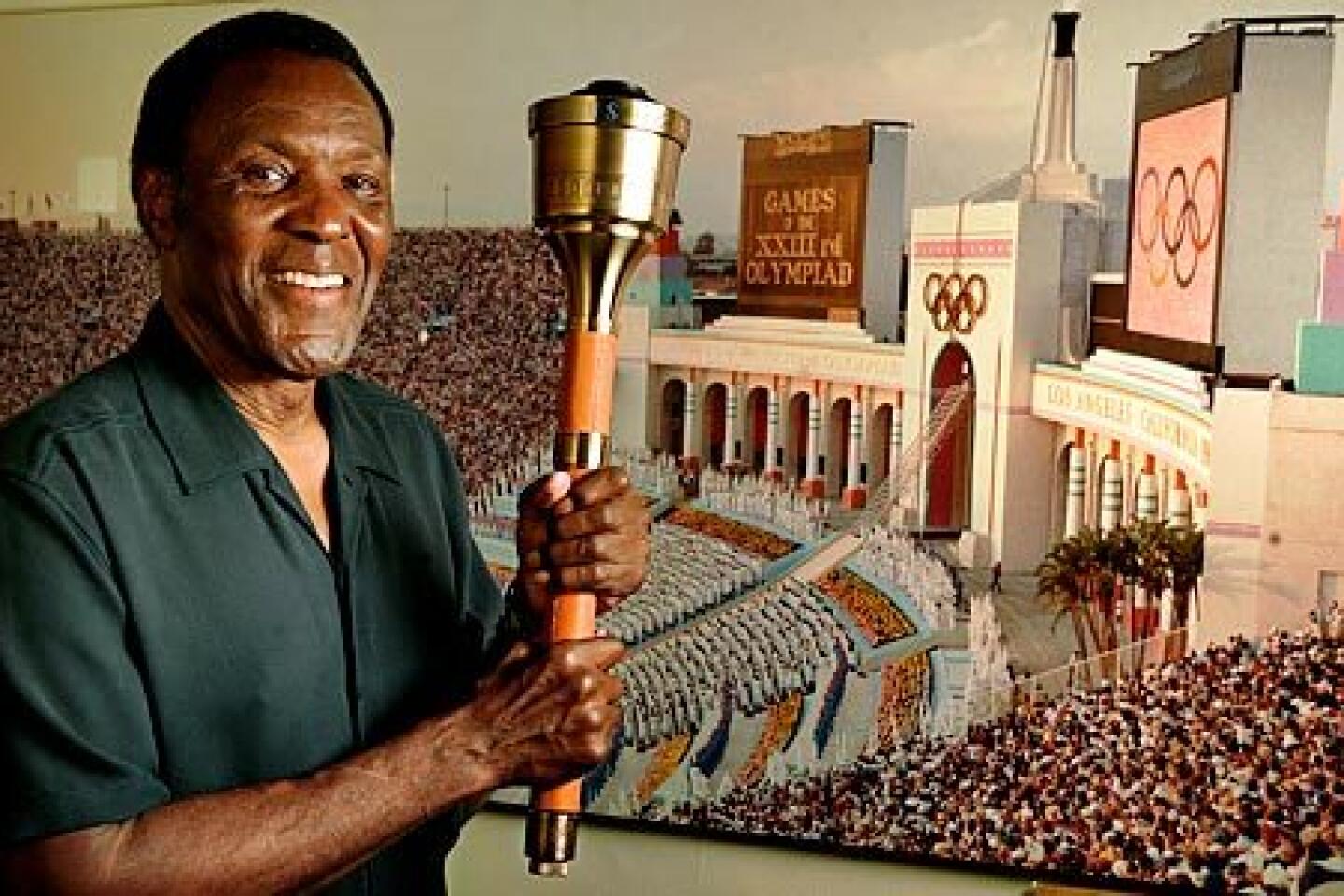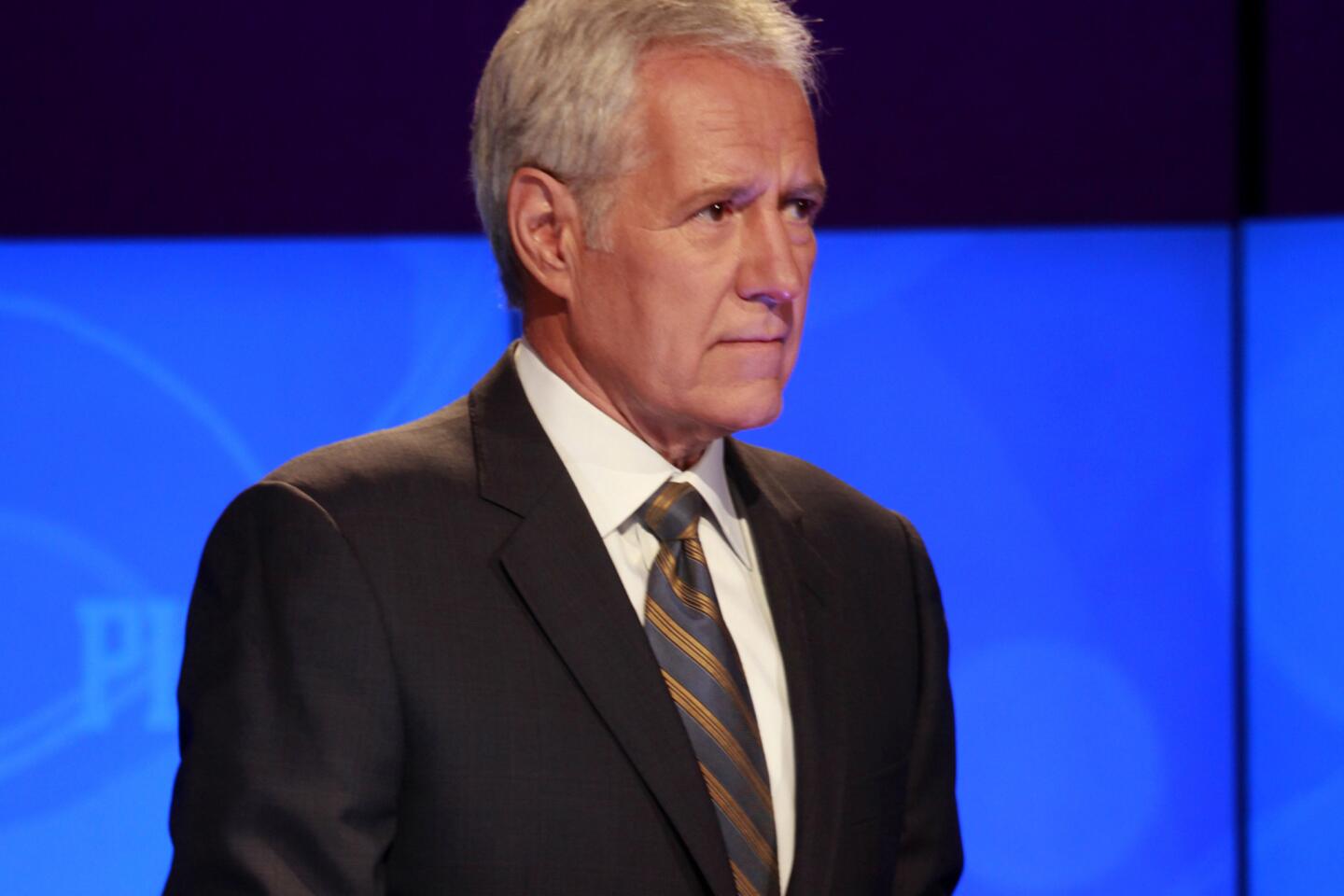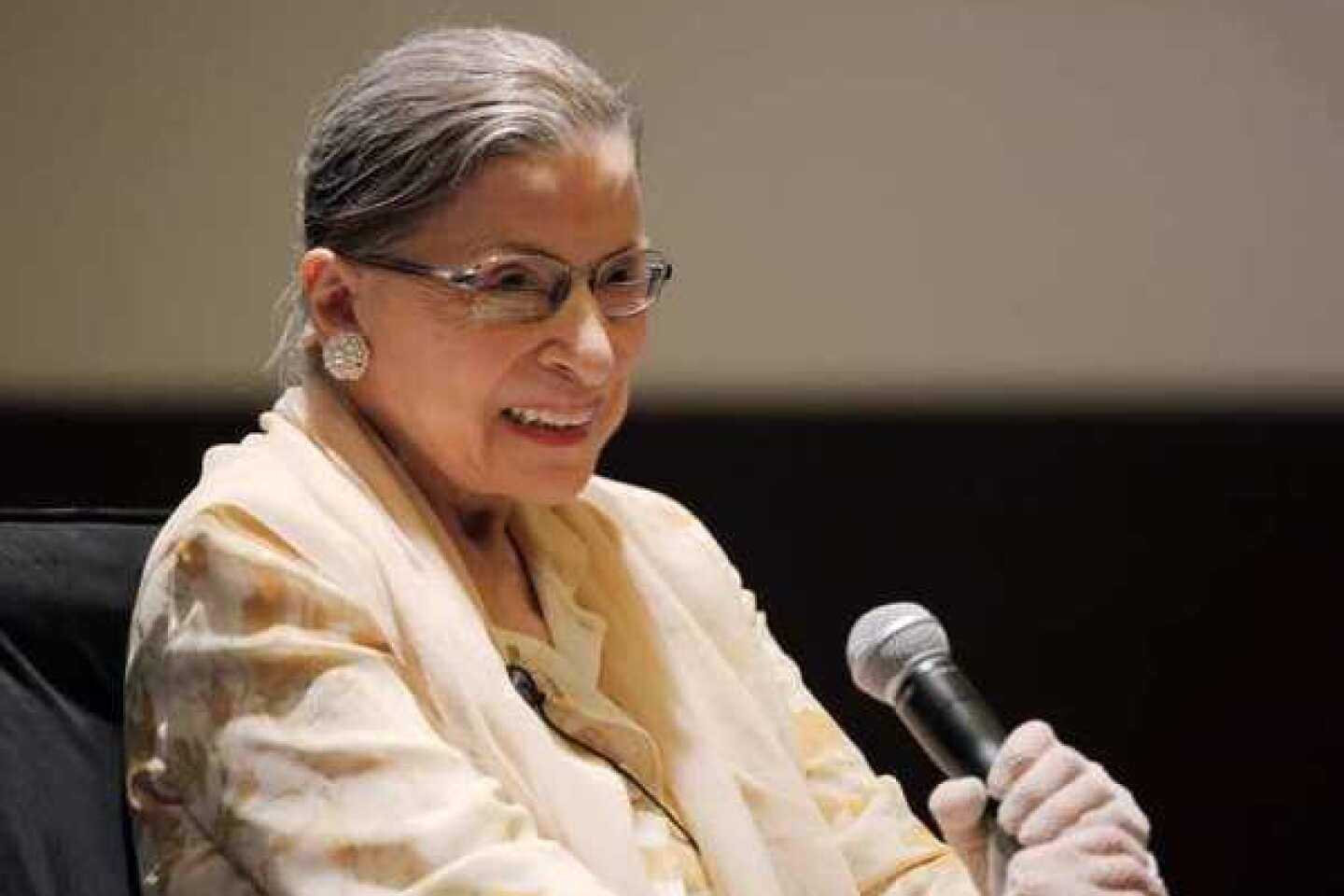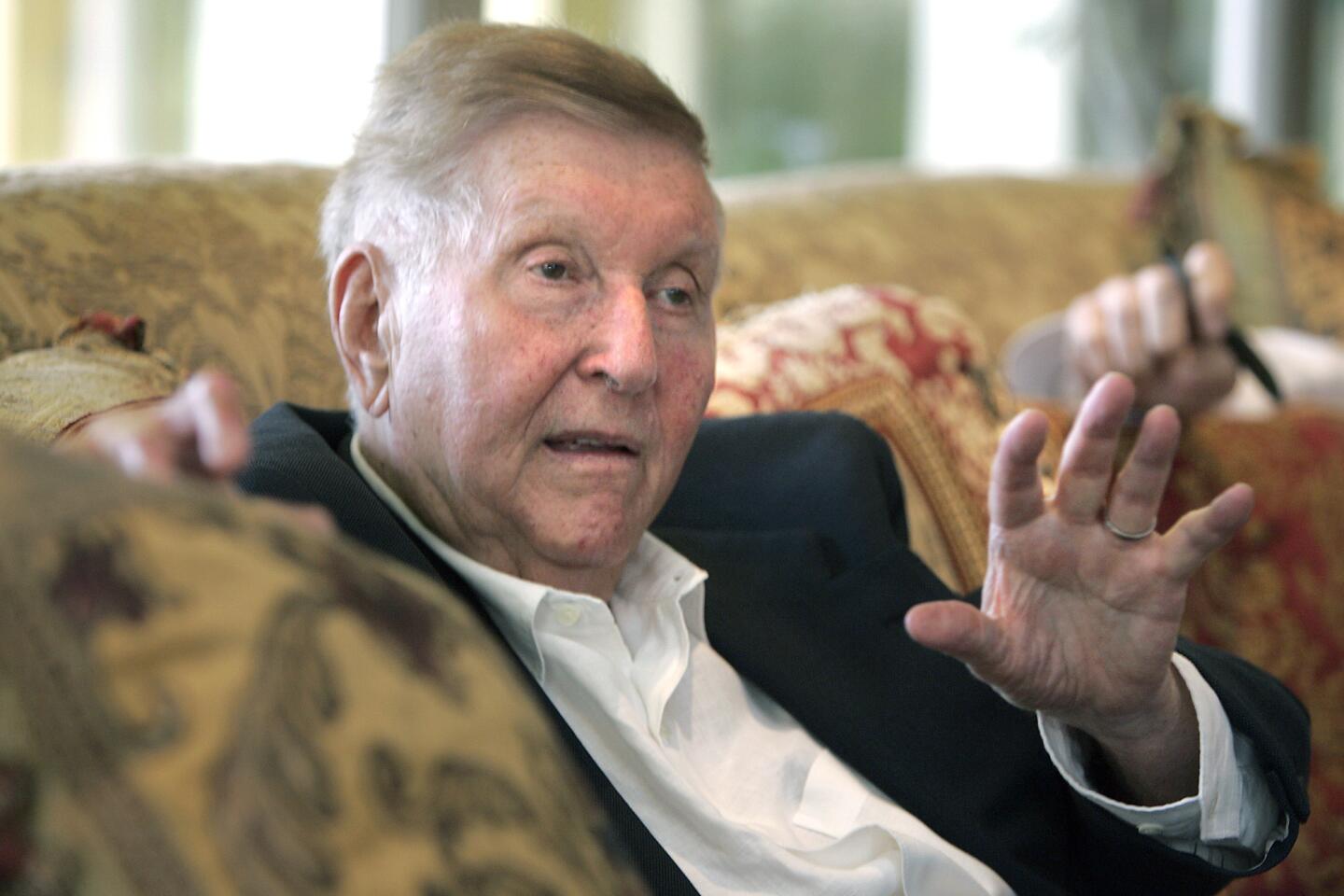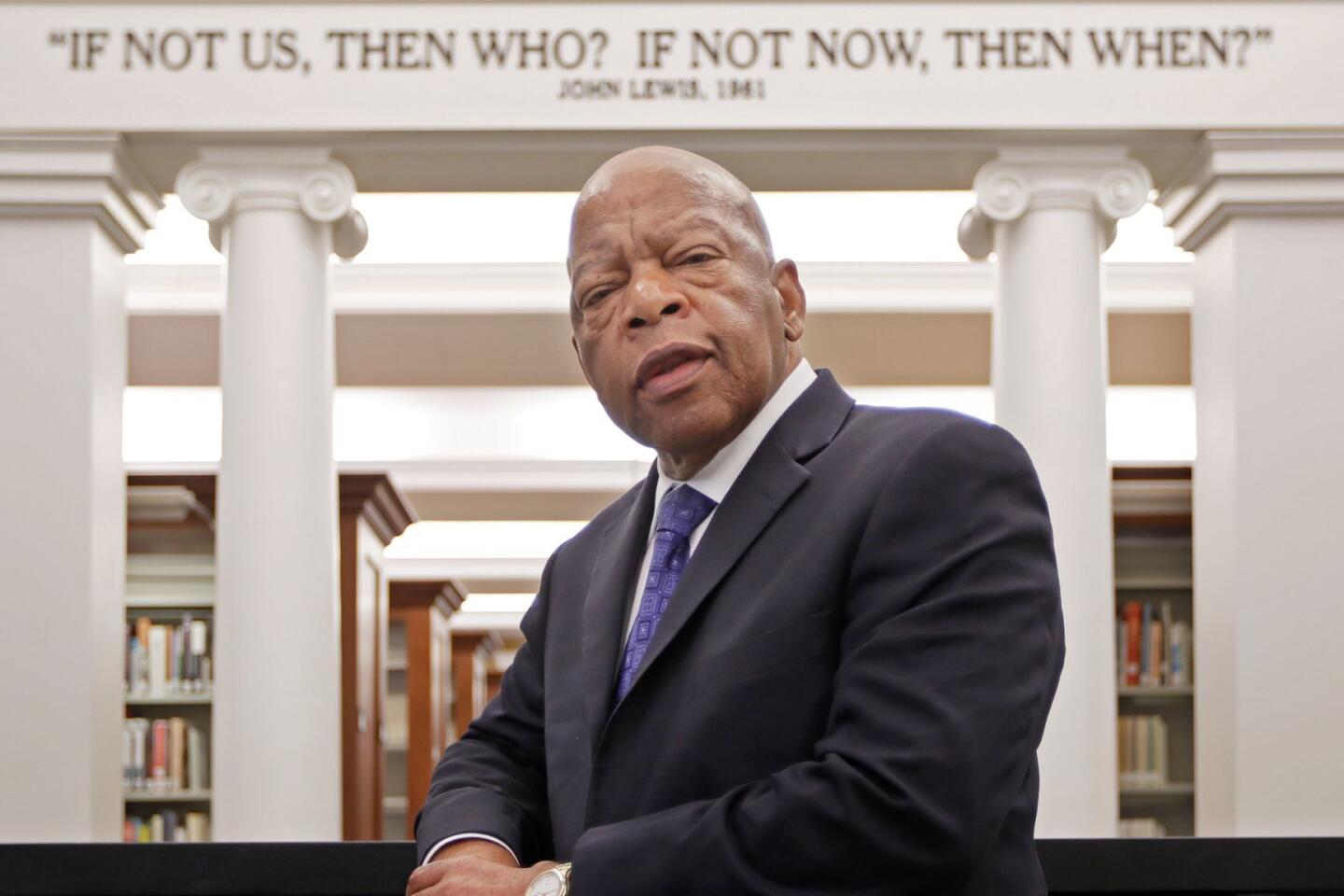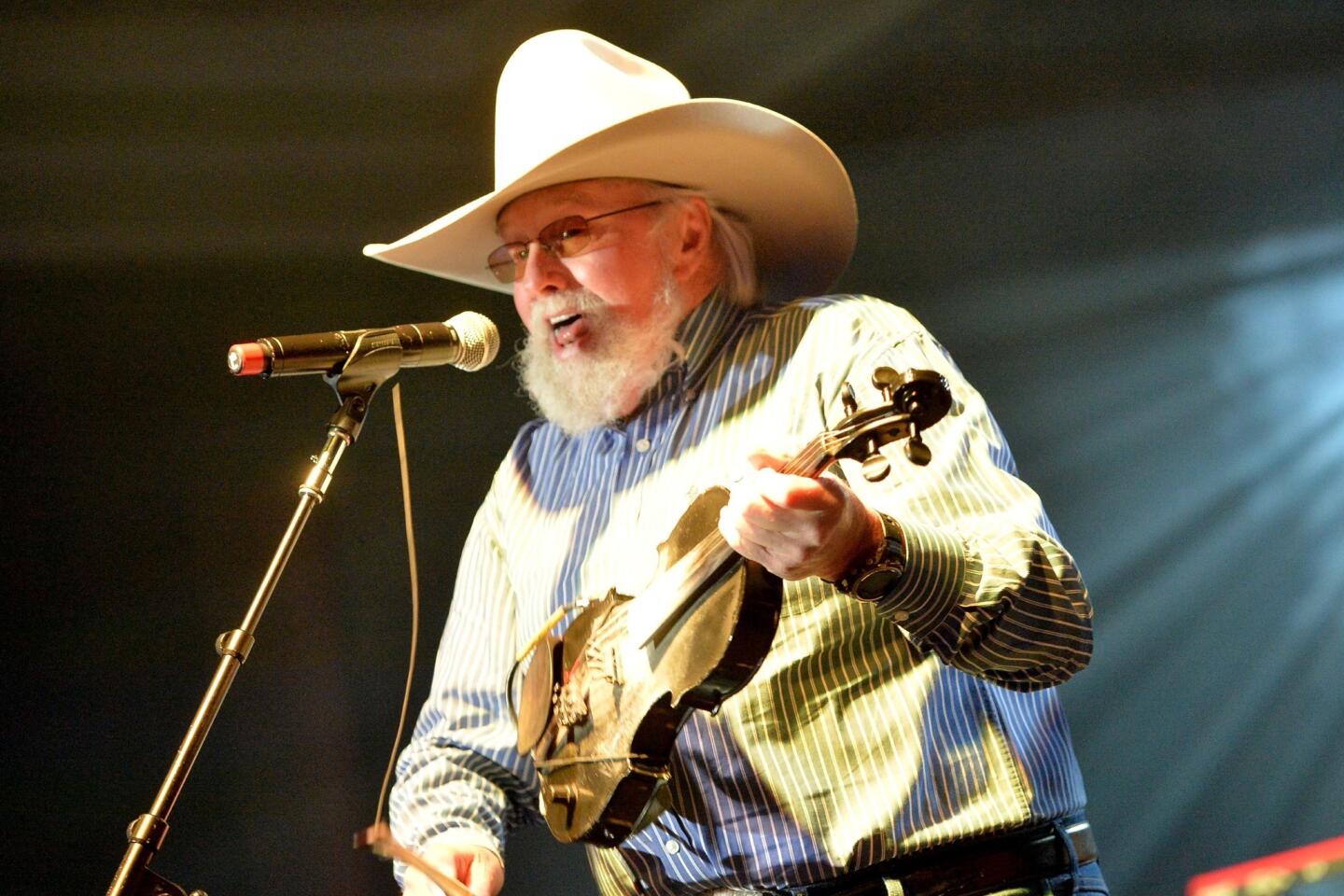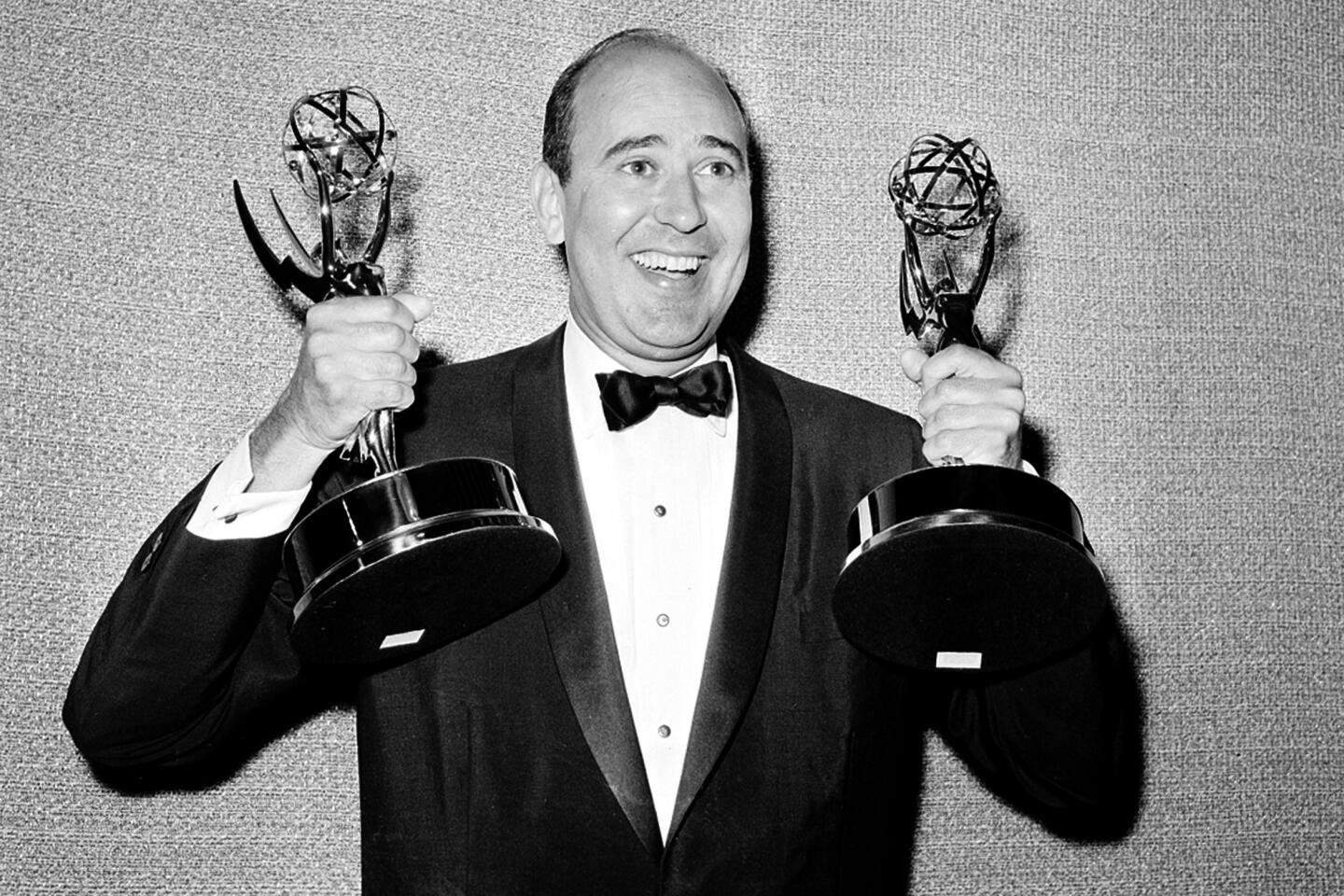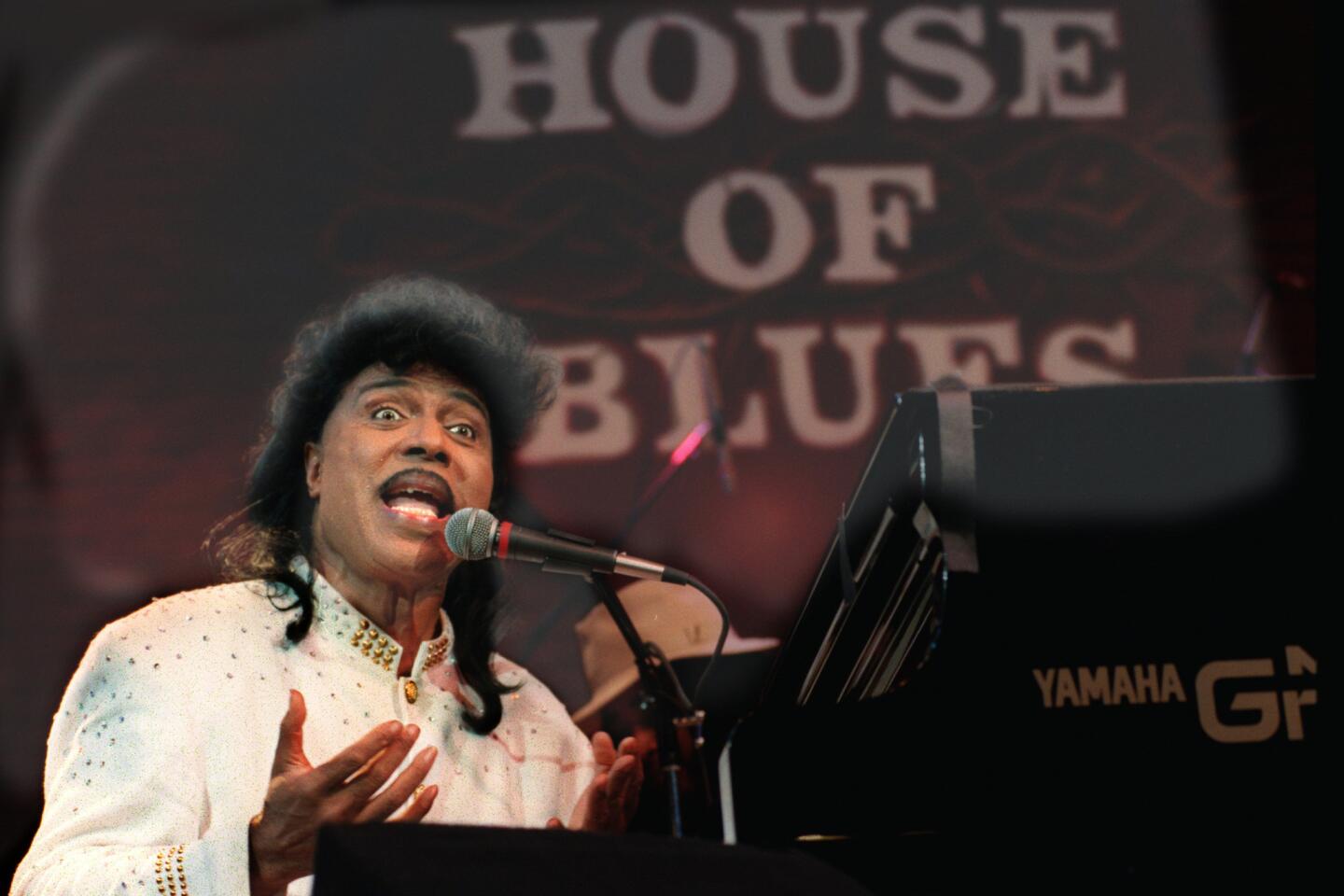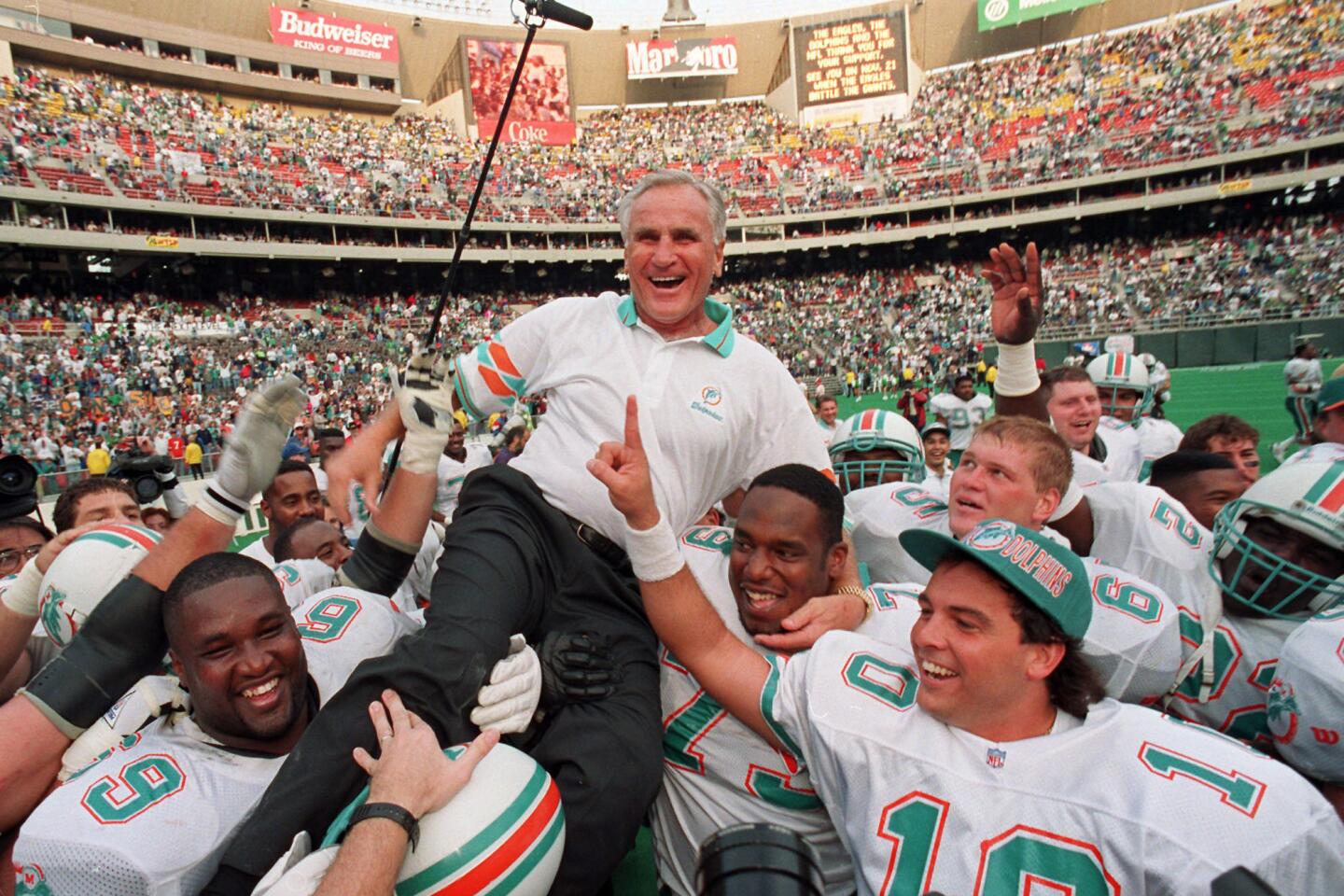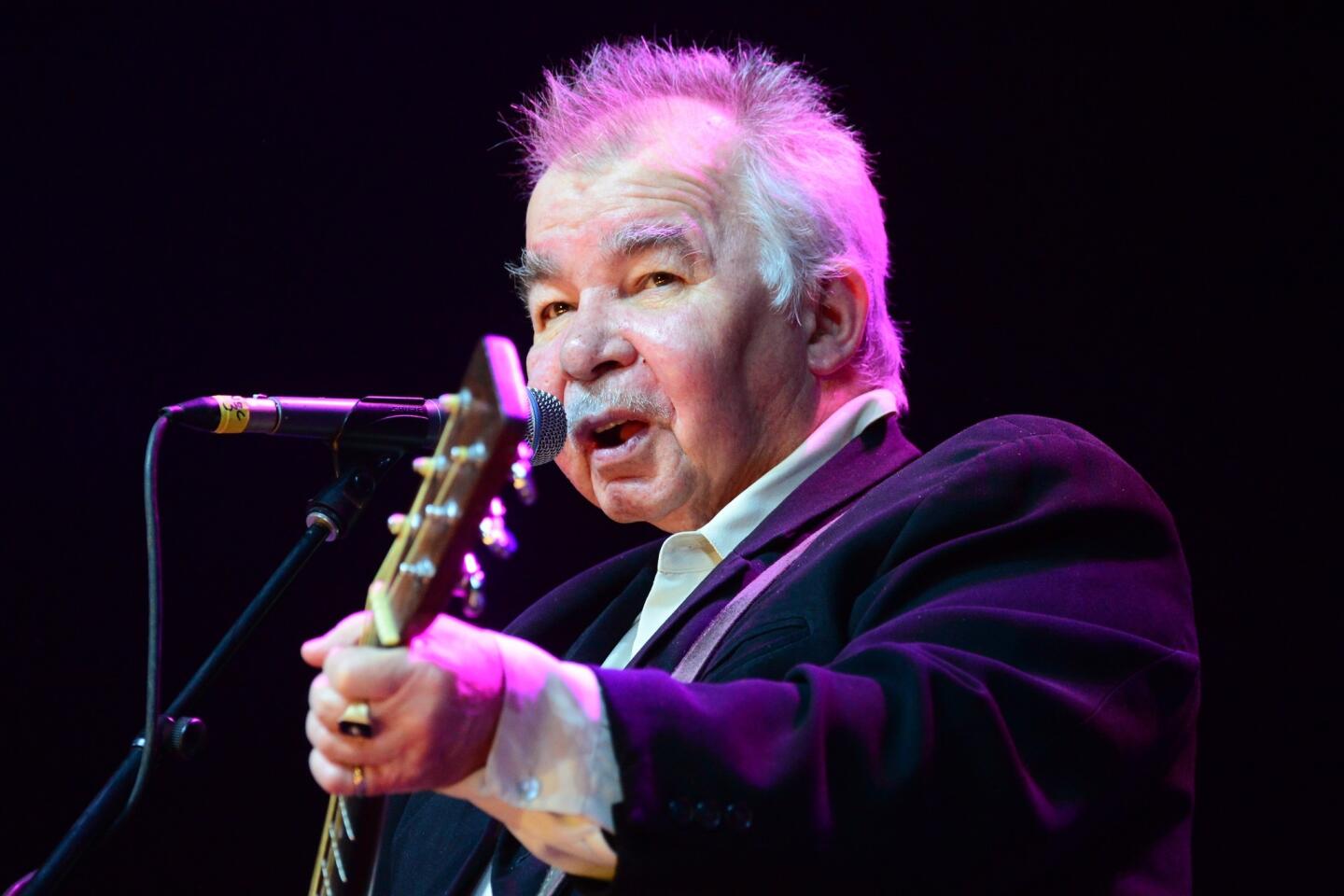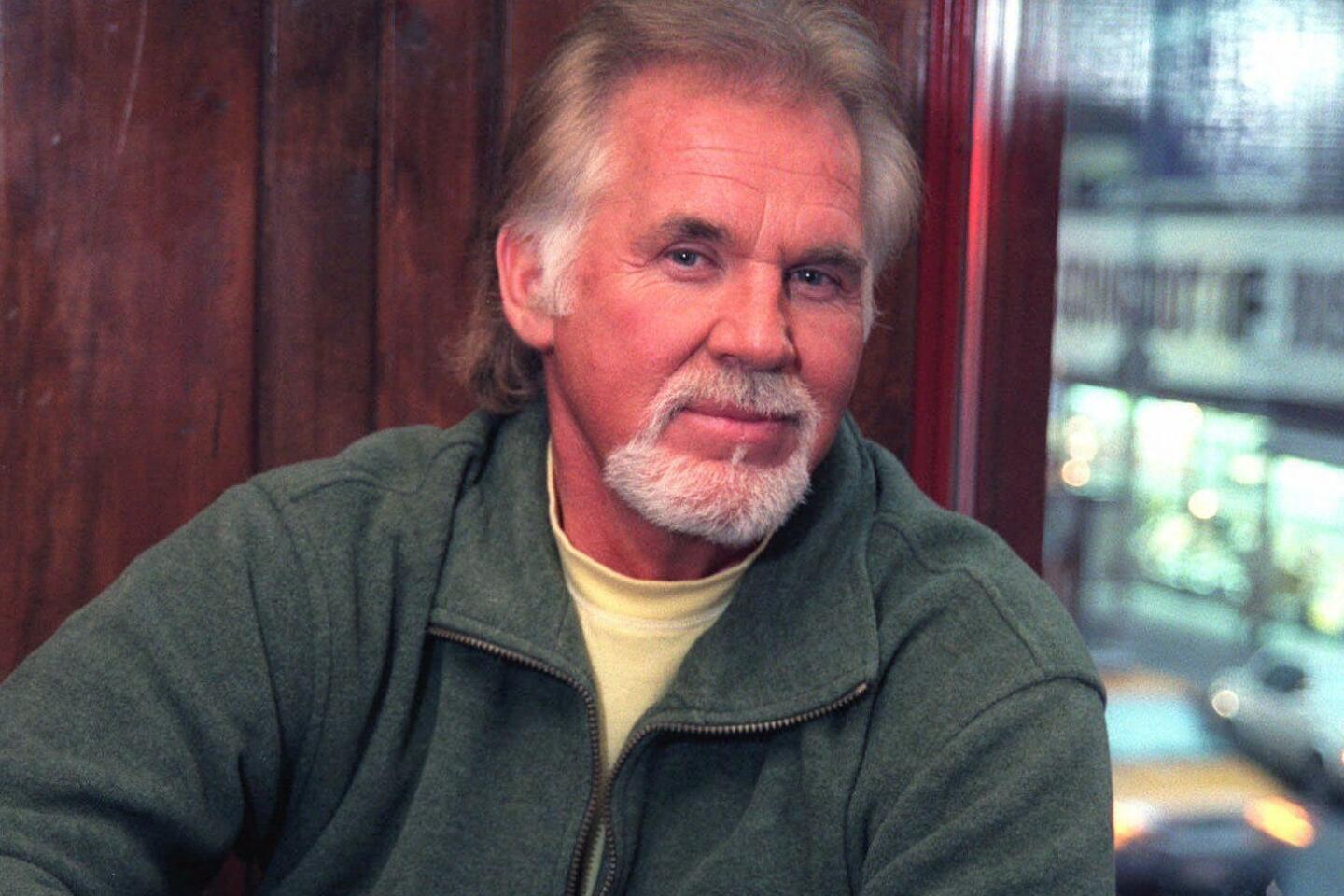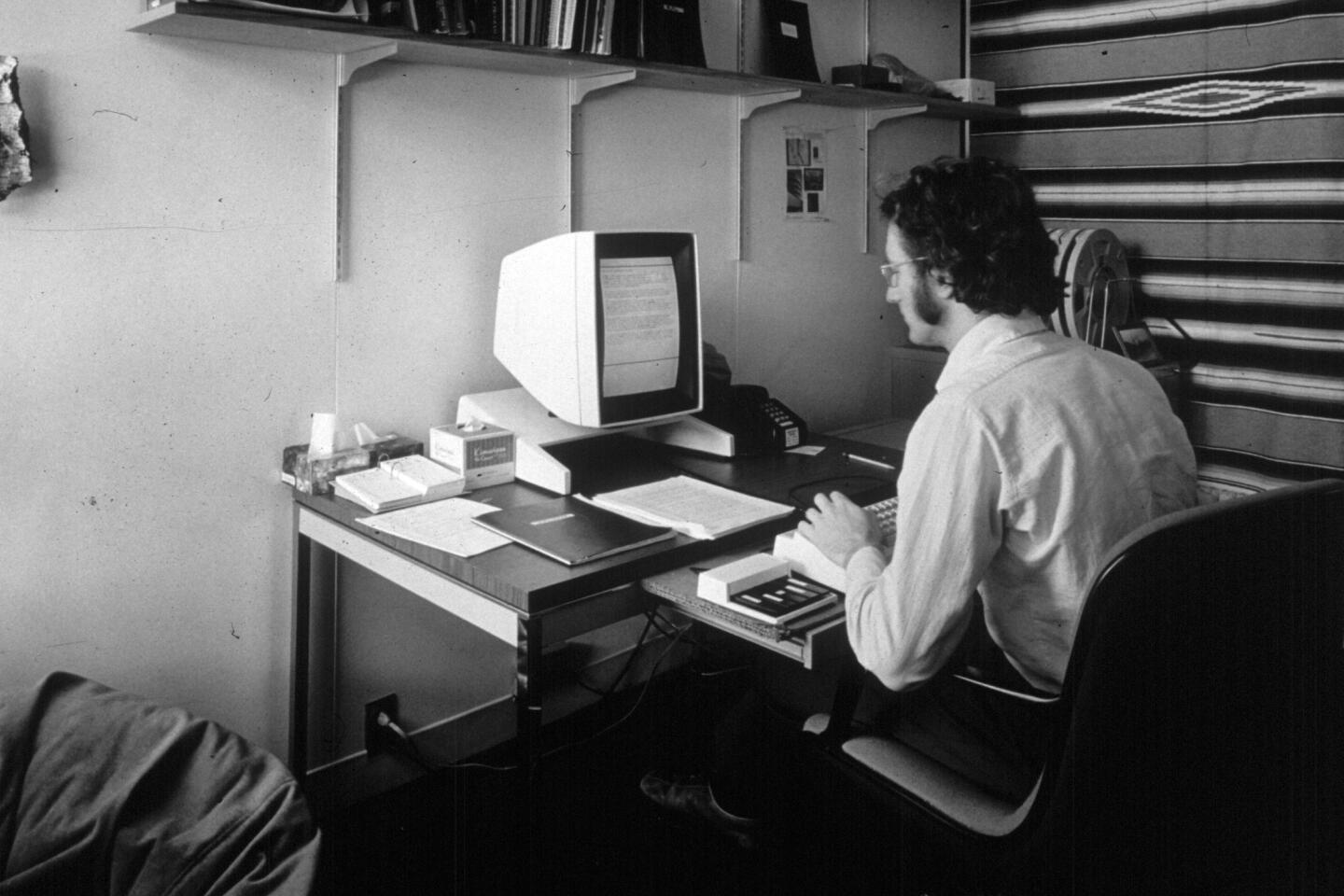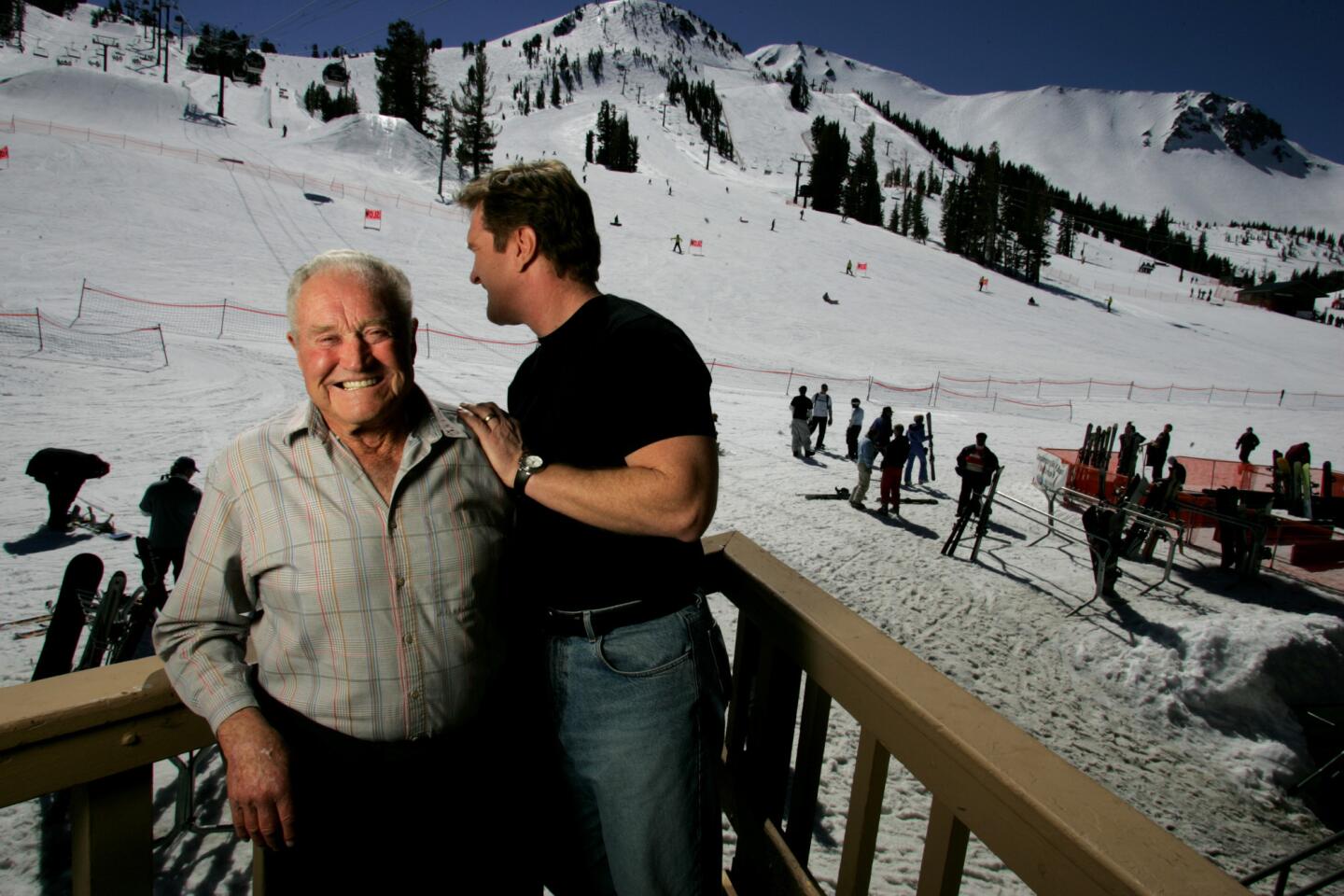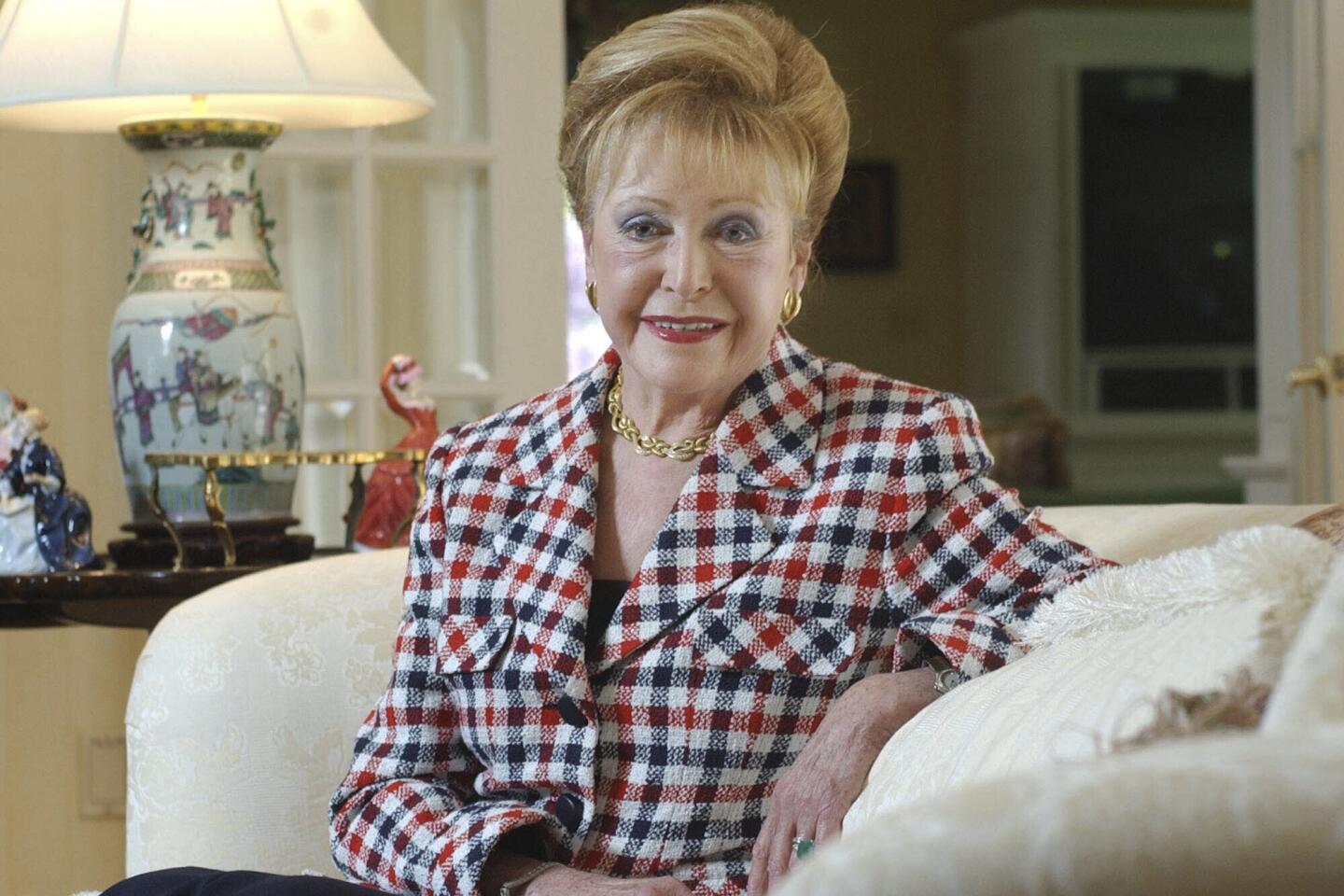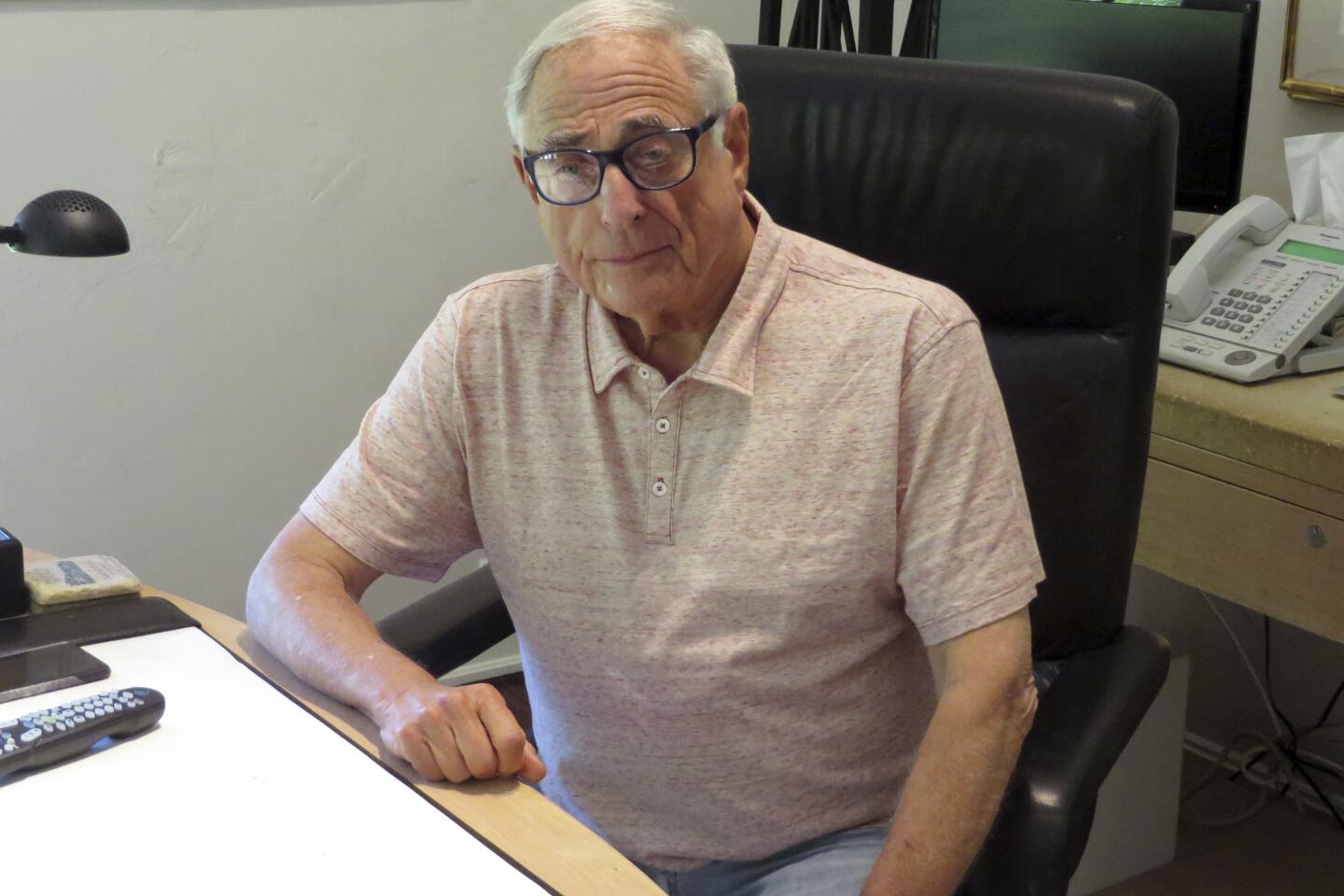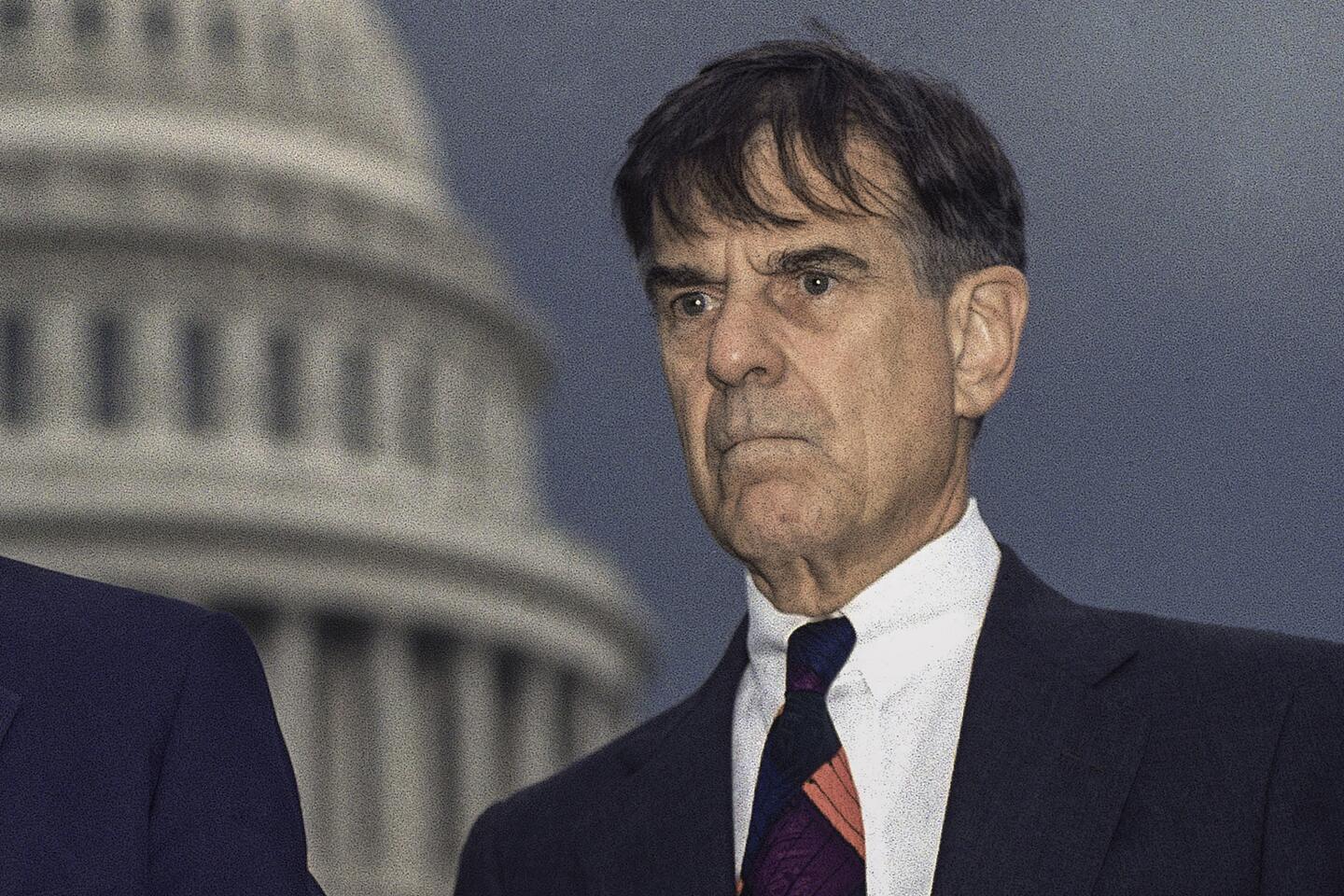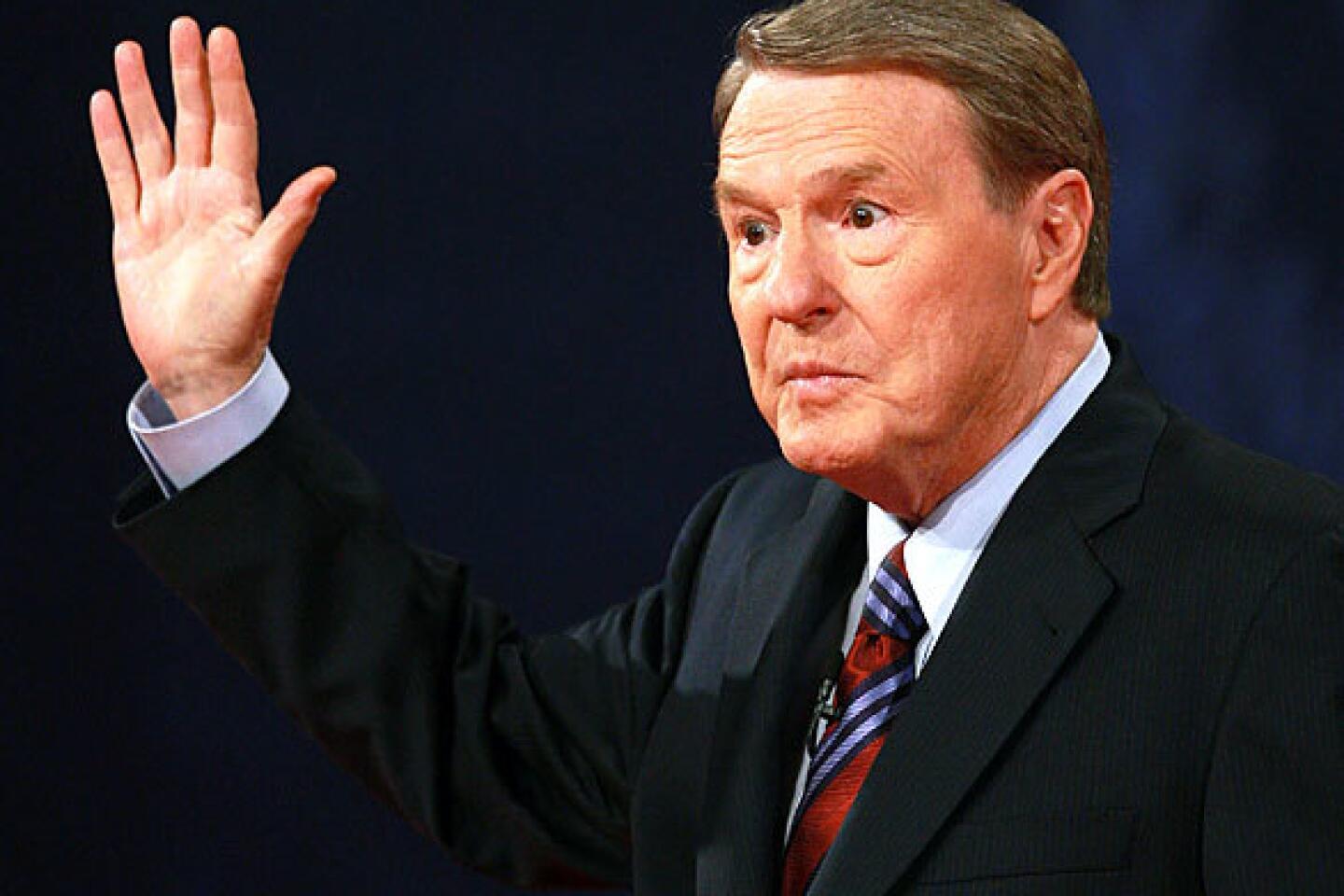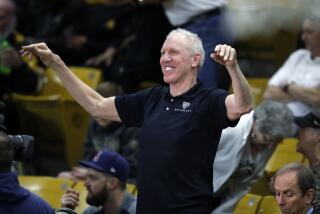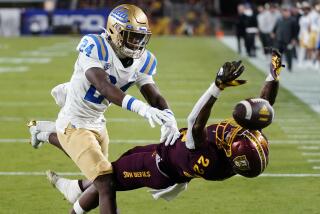Lute Olson, the white-haired dean of the desert who built the University of Arizona’s basketball program into a rollicking national power, has died. He was 85.
Olson died Thursday night in Tucson, where he reportedly was in hospice care. He had been in declining health since his abrupt retirement in 2008, after which his personal physician publicly revealed the former coach had suffered a stroke earlier in the year.
Over a glorious 25-year run, Olson transformed the Wildcats from a sleepy operation that averaged 5,500 fans per game the season before his arrival to one that consistently packed McKale Center and led the Pac-10 Conference in attendance each season. The excitement peaked in 1997, when the Wildcats won the first national championship in their history, and the last by any team in what’s now the Pac-12.
Arizona went to four Final Fours and won 15 conference regular-season and tournament titles under Olson, who compiled a 589-187 record with the Wildcats and enjoyed 23 consecutive NCAA tournament appearances. His 781 career wins, a tally that began with earlier coaching stops at Iowa and Long Beach State, rank 14th in NCAA Division I history.
“What Lute built in Tucson is as impressive a coaching feat as any in the history of college basketball,” former UCLA coach Steve Lavin said in a telephone interview. “Prior to his arrival, no one could have foreseen that the University of Arizona would become a sustained elite program decade after decade.
“Interestingly, Lute was old-school in terms of instilling the toughness, proper fundamentals and basketball habits into his players, yet he also demonstrated creative flexibility in his strategic approach. He had an element of the hip-pocket coaching style where he would surprise or catch opponents off guard because of something in reserve that he could go to in order to give his team an edge. He was as good as it gets and set the gold standard in the Pac-10.”
An inductee into both the Naismith Memorial and National Collegiate basketball halls of fame, Olson registered a Pac-10 winning percentage of .764 that was second only to UCLA coach John Wooden’s .817. The court inside McKale Center was named after Olson in 2000 and became Lute and Bobbi Olson Court the following year, adding the name of his first wife, who had died of ovarian cancer.
“He had no weaknesses as a coach,” Sean Miller, Arizona’s current coach, said in a statement. “He was a relentless recruiter. … He was an astute evaluator of talent. So many of his most accomplished players were not heavily recruited prospects.”
At Arizona, Olson coached 31 players who went on to play in the NBA, including Steve Kerr, a former UCLA ball boy who was not recruited out of Palisades High by the Bruins or any other major college program before Olson gave him a scholarship. Kerr was not athletically gifted, but Olson described recruits’ physical attributes as their most overrated quality.
“The players with great physical ability who don’t have the character or mental capabilities can be the worst kind,” Olson told the Los Angeles Times in 1985, “because the alumni will look at all that talent and say, ‘Why in the world can’t you coach them?’”
Kerr, now coach of the Golden State Warriors, tweeted a photo of Olson instructing him while he played for the Wildcats, adding, “It’s hard to put into words how much Lute Olson meant to me. He was an amazing coach & a wonderful man. Being part of the U of A basketball family changed my life forever. I will never forget Coach O.”
Olson retained an artful sense of humor in his later years even as he spoke in slow, halting sentences, often teasing his players and poking fun at himself.
“I just wonder if they got the hair right on the statue,” he cracked as his famous white mop flapped in the breeze in April 2018 at the ceremony to unveil his bronze likeness outside McKale Center.
The coach also explained that day what had brought him to Tucson after a successful nine-year run at Iowa in which the Hawkeyes made the NCAA tournament in each of his last five seasons, including a trip to the Final Four in 1980.
“When people talk about me coming here in ’83,” Olson said, “I ask them, ‘Have you ever spent nine winters in Iowa City?’”
Robert Luther Olson was born on a grain and livestock farm outside Mayville, N.D., on Sept. 22, 1934, enduring a childhood repeatedly beset by tragedy. His 48-year-old father died of a stroke when the boy who became known as Lute was only 5. Lute’s older brother Amos, then a college senior, returned home to work on the farm but died in a tractor accident nine months later.
1/25
Kobe Bryant, Ruth Bader Ginsburg, Sean Connery and more. (Los Angeles Times)
2/25
Rafer Johnson, winner of the 1960 Olympic decathlon gold medal, was a man whose legacy was interwoven with Los Angeles history, beginning with his performances as a world-class athlete at UCLA and punctuated by the night in 1968 when he helped disarm Robert F. Kennedy’s assassin at the Ambassador Hotel. Johnson lit the Olympic flame at the opening of the 1984 Summer Games in Los Angeles. He was 86.
(Mel Melcon / Los Angeles Times) 3/25
With his quick wit and easy smile,
Alex Trebek drove the game show “Jeopardy!” up the ratings charts and became a welcome television host in America’s living rooms. As the quiz show rolled through the decades, Trebek remained a comfortable fit — in a 2014 Reader’s Digest poll, Trebek ranked as the eighth-most trusted person in the United States, right behind Bill Gates and 51 spots above Oprah Winfrey. He was 80.
(Los Angeles Times) 4/25
Guitarist Eddie Van Halen’s speed and innovations along the fretboard inspired a generation of imitators as the band bearing his name rose to MTV stardom and multiplatinum sales over 10 consecutive albums. The streak made Van Halen one of the most successful bands in rock history, including two albums that reached diamond status (10 million copies sold): 1978’s debut “Van Halen” and 1984’s “1984.” He was 65.
(Wibbitz/Getty) 5/25
Justice Ruth Bader Ginsburg championed women’s rights — first as a trailblazing civil rights attorney who methodically chipped away at discriminatory practices, then as the second woman to serve on the Supreme Court, and finally as an unlikely pop culture icon. A feminist hero dubbed Notorious RBG, Ginsburg became the leading voice of the court’s liberal wing, best known for her stinging dissents on a bench that mostly skewed right since her 1993 appointment. She was 87.
(Kiichiro Sato / Associated Press) 6/25
Chadwick Boseman’s breakout role was playing Dodger Jackie Robinson in the 2013 sports biopic “42.” The next year, he made an electrifying lead turn as James Brown, the Godfather of Soul, in “Get on Up.” Then came the role that would change his career: As
Black Panther, the Marvel Cinematic Universe’s first Black superhero, Boseman became the face of Wakanda to millions of fans around the world and helped usher in a new and inclusive era of superhero blockbusters. He was 43.
(Jay L. Clendenin / Los Angeles Times) 7/25
Sumner Redstone outmaneuvered rivals to assemble one of America’s leading entertainment companies, now called ViacomCBS, which boasts CBS, Comedy Central, MTV, Nickelodeon, BET, Showtime, the Simon & Schuster book publisher and Paramount Pictures movie studio. Unlike contemporaries Rupert Murdoch and Ted Turner, Redstone was not a visionary, but rather a hard-charging lawyer and deal maker who pursued power and wealth through the accumulation of content companies. He was 97.
(Brian Vander Brug / Los Angeles Times) 8/25
Regis Philbin reigned for decades as the comfortable and sometimes cantankerous morning host of “Live,” first with Kathie Lee Gifford and later Kelly Ripa, above. He earned Emmy nominations by the armful, hosted New Year’s Eve specials, rode in parades, set a record for the most face-time hours on television and helped reinvigorate prime-time game shows with “Who Wants to Be a Millionaire.” He was 88.
(Charles Sykes / Associated Press) 9/25
Rep. John Lewis famously shed his blood at the foot of a Selma, Ala., bridge in a 1965 demonstration for Black voting rights, and went on to become a 17-term Democratic member of Congress. An inspirational figure for decades, Lewis was one of the last survivors among members of the Rev. Martin Luther King Jr.’s inner circle. He was 80.
(Mark Humphrey / Associated Press) 10/25
Country music firebrand and fiddler Charlie Daniels started out as a session musician, which included playing on Bob Dylan’s 1969 album “Nashville Skyline,” and beginning in the early 1970s toured endlessly with his own band, sometimes doing 250 shows a year. In 1979, Daniels had a crossover smash with “The Devil Went Down to Georgia,” which topped the country chart, hit No. 3 on the pop chart and was voted single of the year by the Country Music Assn. He was 83.
(Rick Diamond / Getty Images for IEBA) 11/25
Carl Reiner first came to national attention in the 1950s on Sid Caesar’s “Your Show of Shows,” where he wrote alongside Mel Brooks, Neil Simon and other comedy legends. He later created “The Dick Van Dyke Show,” one of TV’s most fondly remembered sitcoms, and directed hit films including “The Comic” (1969), starring Van Dyke; “Where’s Poppa?” (1970), starring George Segal and Ruth Gordon; “Oh, God!” starring George Burns and John Denver; and four films starring Steve Martin. He was 98.
(Associated Press ) 12/25
The flamboyant, piano-pounding Little Richard roared into the rock ‘n’ roll spotlight in the 1950s with hits such as “Tutti-Frutti,” “Long Tall Sally” and “Good Golly, Miss Molly.” The Georgia native’s raucous sound fused gospel
fervor and R&B sexuality, profoundly influencing the Beatles, James Brown (who succeeded him in one of his early bands), Jimi Hendrix (one of his backup musicians in the mid-’60s) and Bruce Springsteen. He was 87.
(Boris Yaro / Los Angeles Times) 13/25
Don Shula was the NFL’s winningest coach, leading the 1972 Miami Dolphins to the league’s only undefeated season. He coached the Baltimore Colts to one Super Bowl and the Dolphins to five, winning Lombardi Trophies after the 1972 and ’73 seasons. He was 90.
(ASSOCIATED PRESS) 14/25
Former Egyptian
President Hosni Mubarak crushed dissent for decades until the 2011 Arab Spring movement drove him from power. During his presidency, which spanned nearly 30 years, he protected Egypt’s stability as intifadas roiled Israel and the Palestinian territories, the U.S. led two wars against Iraq, Iran fomented militant Shiite Islam across the region and global terrorism complicated the divide between East and West. He was 91.
(Sameh Sherif / AFP/Getty Images) 15/25
Among his 40-odd films,
burly Brian Dennehy played a sheriff who jailed Rambo in “First Blood,” a serial killer in “To Catch a Killer” and a corrupt sheriff in “Silverado.” On Broadway, he was awarded Tonys for his roles in “Death of a Salesman” (1999) and “Long Day’s Journey Into Night” (2003). He was 81.
(Dia Dipasupil) 16/25
Singer-songwriter John Prine broke onto the folk scene in 1971 with a self-titled album that included two songs brought to broader audiences by Bette Midler and Bonnie Raitt: “Hello in There” and “Angel From Montgomery,” respectively. In 2019, he was elected to the Songwriters Hall of Fame. He was 73.
(Frazer Harrison / Getty Images for Stagecoach) 17/25
Country singer Kenny Rogers racked up an impressive string of hits — initially as a member of The First Edition starting in the late 1960s and later as a solo artist and duet partner with Dolly Parton — and earned three Grammy Awards, 19 nominations and a slew of accolades from country-music awards shows. Country purists balked at his syrupy ballads, but his fans packed arenas that only the titans of rock could fill. He was 81.
(Suzanne Mapes / Associated Press) 18/25
Xerox researcher Larry Tesler pioneered concepts that made computers more user-friendly, including moving text through cut, copy and paste. In 1980, he joined Apple, where he worked on the Lisa computer, the Newton personal digital assistant and the Macintosh. He was 74.
(AP) 19/25
Ski industry pioneer Dave McCoy transformed a remote Sierra peak into the storied Mammoth Mountain Ski Area. Over six decades, it grew from a downhill depot for friends to a profitable operation of 3,000 workers and 4,000 acres of ski trails and lifts, a mecca for generations of skiers and boarders. He was 104. (Genaro Molina / Los Angeles Times)
20/25
Screen icon
Kirk Douglas brought a clenched-jawed intensity to an array of heroes and heels, receiving Oscar nominations for his performances as an opportunistic movie mogul in the 1952 drama “The Bad and the Beautiful” and as Vincent van Gogh in the 1956 drama “Lust for Life.” As executive producer of “Spartacus,” Douglas helped end the Hollywood blacklist by giving writer Dalton Trumbo screen credit under his own name. He was 103.
(Annie Wells / Los Angeles Times) 21/25
“Queen of Suspense”
Mary Higgins Clark became a perennial best-seller, writing or co-writing “A Stranger Is Watching,” “Daddy’s Little Girl” and more than 50 other favorites. Her sales topped 100 million copies, and many of her books, including “A Stranger is Watching” and “Lucky Day,” were adapted for movies and television. She was 92.
(Associated Press) 22/25
Fred Silverman was the head of programming at CBS, where he championed a string of hits including “The Mary Tyler Moore Show,” “All in the Family,” “MASH” and “The Jeffersons.” Later at ABC, he programmed “Laverne & Shirley,” “The Love Boat,” “Happy Days” and the 12-hour epic saga “Roots.” He was 82.
(Associated Press) 23/25
Former California
Rep. Fortney “Pete” Stark Jr. represented the East Bay in Congress for 40 years. The influential Democrat helped craft the Affordable Care Act, the signature healthcare achievement of the Obama administration, and also created the 1986 law best known as COBRA, which allows workers to stay on their employer’s health insurance plan after they leave a job. He was 88.
(Associated Press) 24/25
News anchor
Jim Lehrer appeared 12 times as a presidential debate moderator and helped build “PBS NewsHour” into an authoritative voice of public broadcasting. The program, first called “The Robert MacNeil Report” and then “The MacNeil-Lehrer Report,” became the nation’s first one-hour TV news broadcast in 1983. Lehrer was 85.
(David McNew / Getty Images) 25/25
Terry Jones was a founding member of the Monty Python troupe who wrote and performed for their early ’70s TV series and films including “Monty Python and the Holy Grail” in 1975 and “Monty Python’s Life of Brian” in 1979. After the Pythons largely disbanded in the 1980s, Jones wrote books on medieval and ancient history, presented documentaries, wrote poetry and directed films. He was 77.
(Associated Press) Known for his relentlessness, Olson was an undersized 6-foot-4 center on Grand Forks Central High’s North Dakota state championship basketball team. He later played football, basketball and baseball at Augsburg College in Minneapolis, where also worked the midnight shift at a service station and manned a summer distribution route for a soda company.
His early coaching gigs were equally modest. At his first stop in Mahnomen, a town of 1,200 in Minnesota, his high school team won its first league championship in 34 years. Olson and Bobbi moved to California in 1962 for a series of jobs in which he helped build programs at Western and Loara high schools in Anaheim and Marina High in Huntington Beach.
Dave Brown remembered being warmly greeting by “this big, tall guy” when he showed up at Marina in 1965 as a novice teacher who was assigned to learn from Olson. Brown quickly envisioned a more lucrative future for the coach who drove a Texaco gas truck at night and taught driver’s education on Saturdays to make extra money.
“He just had that certain something,” said Brown, who went on to win 814 games at the high school level. “He always had that big smile, but he was hard-nosed. He really coached the kids hard, but they loved him, and he was a winner.”
Olson’s big break came in 1969 courtesy of the sports pages. Then 35 years old and aching for a college job, he read one morning that the coach at Long Beach City College was leaving and he applied for the vacancy. He got the job and won 103 games in four seasons before moving to Long Beach State for one season and going 24-2 with a team that included four players who went on to the NBA.
The coach was on his way as well, heading back east the next season to Iowa and eventually becoming an Arizona icon.
Olson is survived by his wife, Kelly, and children Christi, Greg, Jodi, Steve and Vicki. Services are pending.
